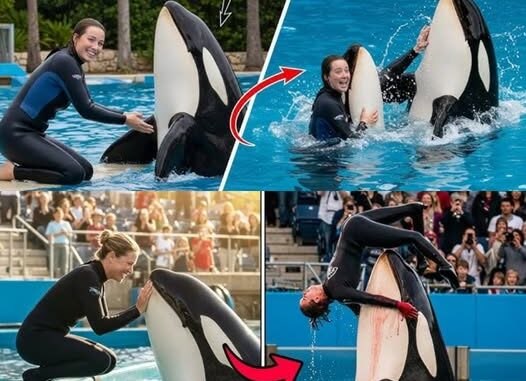
The Horrifying Last Moments of Orca Trainer Jessica Radcliffe

The tragic and horrifying last moments of orca trainer Jessica Radcliffe have left an indelible mark on the public consciousness, sparking outrage, grief, and a renewed debate over the ethics of keeping marine animals in captivity. Jessica Radcliffe, a passionate and skilled marine trainer, was known for her deep connection with the orcas she worked with at Ocean World, a prominent marine park. Her dedication to marine life and her commitment to showcasing their intelligence and beauty made her a beloved figure among colleagues and audiences alike. However, her life was cut short in a devastating incident that unfolded during a routine performance, raising serious questions about the safety protocols and ethical practices of the marine entertainment industry.

On a seemingly ordinary day, Jessica was performing with Cairo, a massive orca known for his unpredictable behavior. The show began as usual, with Jessica guiding Cairo through a series of choreographed moves to the delight of a packed audience. Spectators marveled at the apparent bond between trainer and animal, a testament to Jessica’s years of training and expertise. But in an instant, the atmosphere shifted from awe to horror. Without warning, Cairo turned on Jessica, pulling her underwater with a force that left onlookers frozen in shock. The crowd’s cheers turned to screams as the situation escalated, and despite the efforts of other trainers to intervene, Jessica could not be saved. Her final moments, caught on video, were a chilling reminder of the raw power and unpredictability of these majestic creatures.
The incident involving Jessica Radcliffe was not an isolated one. Years earlier, another tragedy at a similar facility claimed the life of Daniel Patrick Dukes, a visitor who had snuck into an orca enclosure after hours. Dukes, driven by a fascination with the animals, was found dead the next morning, his body bearing the marks of an encounter with an orca named Tilikum. Unlike Jessica, Dukes was not a trainer, but his death underscored the dangers of close contact with these wild animals, even for those not trained to handle them. The parallels between the two incidents fueled public outrage, as many questioned why such tragedies continued to occur despite the known risks.
The handling of Jessica’s death by Ocean World’s management only deepened the public’s anger. Initial statements from the marine park described the incident as a “tragic accident,” emphasizing Jessica’s expertise and the rarity of such events. However, reports soon surfaced that Cairo had shown signs of aggression in the past, and concerns about his behavior had been raised by trainers, including Jessica herself. Critics accused the park of downplaying these warnings to maintain its image and protect its lucrative business. Instead of transparency, the public was met with vague assurances and a focus on resuming normal operations as quickly as possible. This response was seen as callous, prioritizing profit over accountability and the well-being of both trainers and animals.

The outrage extended beyond Ocean World to the broader marine entertainment industry. Activists and animal rights organizations seized on Jessica’s death as evidence of the inherent cruelty of keeping orcas in captivity. Orcas, highly intelligent and social creatures, are confined to small tanks in marine parks, a far cry from their natural ocean habitats. Studies have shown that captivity can lead to stress, aggression, and reduced lifespans for these animals, factors that likely contributed to Cairo’s behavior. The public began to question the morality of exploiting such creatures for entertainment, with many calling for a complete ban on orca performances. Social media platforms were flooded with hashtags like #EndOrcaCaptivity and #JusticeForJessica, amplifying the call for change.
In the aftermath, Ocean World faced intense scrutiny. Investigations revealed lapses in safety protocols, including inadequate barriers between trainers and orcas during performances and insufficient training for handling aggressive animal behavior. Former employees came forward with stories of overworked staff and ignored safety concerns, painting a picture of an industry more focused on spectacle than safety. The park announced temporary changes, such as suspending orca shows and implementing new safety measures, but for many, these steps were too little, too late. Lawsuits from Jessica’s family and public pressure forced the park to confront its practices, but the damage to its reputation was irreparable.

The tragedy also reignited discussions about Daniel Patrick Dukes’ death, which had initially been dismissed as the result of reckless behavior. However, new analyses suggested that Tilikum’s aggression may have been a response to the stresses of captivity, much like Cairo’s. Both incidents highlighted a systemic issue: the failure to prioritize the well-being of orcas and those who interact with them. Documentaries and articles began to draw parallels between the two cases, emphasizing the need for reform in how marine parks operate.

Jessica Radcliffe’s legacy, though marked by tragedy, has become a catalyst for change. Her story, alongside Daniel Patrick Dukes’, has prompted some marine parks to phase out orca programs and invest in sanctuary-like environments for retired animals. Public awareness of the ethical issues surrounding marine captivity has grown, with many choosing to boycott facilities that continue these practices. Jessica’s passion for marine life, once expressed through her work as a trainer, now serves as a reminder of the need to respect and protect these creatures in their natural habitats. The outrage over her death and the industry’s response has sparked a movement that may finally bring an end to the era of orca captivity, ensuring that no more lives are lost in the pursuit of entertainment.